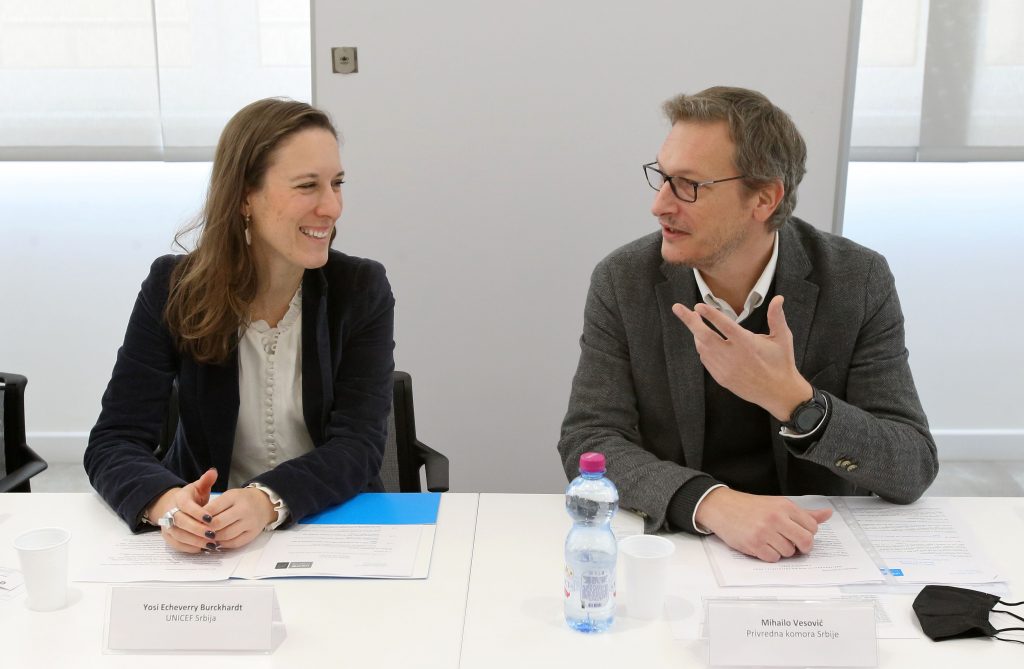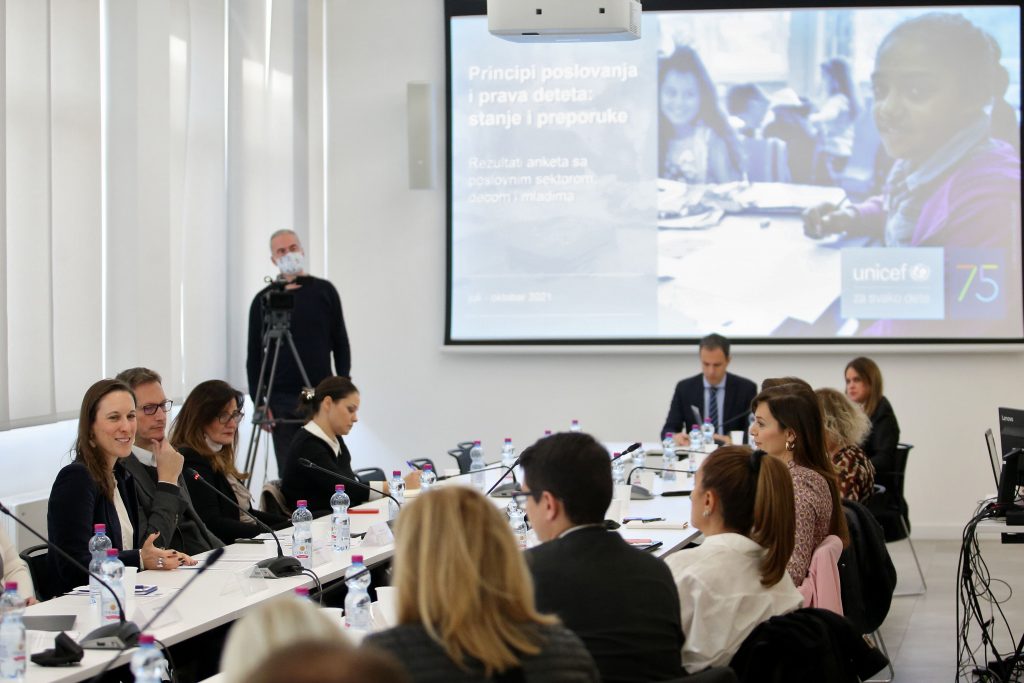YOUNG PEOPLE HAVE HIGHER EXPECTATIONS FROM THE BUSINESS SECTOR
Children and young people should be important stakeholders for the business sector because business operations have both a direct and indirect impact on them from the workplace, market, community and environment perspective, all in accordance with the Children’s Rights and Business Principles. This is the conclusion of the meeting organized by the Serbian Chamber of Commerce and UNICEF on the occasion of the World Children’s Day, which was also attended by representatives of business associations and the business sector.

During August and September of this year, UNICEF conducted the 4th survey on the Children’s Rights and Business Principles in Serbia, with the aim of considering their application in the corporate responsibility of companies in Serbia. The results of the survey showed that most of the surveyed companies believe that they affect children, but that they do not map them as their stakeholders. On the other hand, the children, respondents in the survey, believe that companies in Serbia do not take enough care of children and young people and have high expectations from the business sector to support them in their future development by providing internships, mentoring and volunteering opportunities.
“Childhood is a unique period of accelerated development of a person, during which their physical and mental health can be affected – in a positive or negative way – but it leaves a mark for the entire life. As a reminder, children and young people are not only right holders, but also stakeholders in the business sector. They are young workers, consumers and community members. For the business sector, investing in children as investing in current and future consumers, employees, shareholders and leaders seems to be a simple and solid business strategy, both from a social and economic perspective. UNICEF Serbia cooperates with the business sector in many areas – from financial involvement, innovation, contributions through business knowledge and expertise and raising the awareness of the business sector about its impact on children. Our experience so far provides us with a foundation to believe that cooperation with the business sector will create changes that will lead to the full respect for the rights and real needs of children and youth and integrate them into sustainable business operation”, said UNICEF Serbia Deputy Representative, Yosi Echeverry Burckhardt.
According to UNICEF’s survey, the most represented areas of the business sector’s support for improving the wellbeing and rights of children and youth in the period from 2019 to 2021 were the donations of medical equipment for health care institutions, support for children to get involved in sports and recreation, improvement of formal and non-formal education, improvement of children’s health and healthy lifestyles, improvement of living conditions in the local community and investments in local infrastructure. The least represented areas were the protection of children from violence and abuse, advocacy for child rights and mental health of adolescents. The obtained findings indicate that companies in Serbia support those areas that are close to their business activities, not paying enough attention to systemic problems in society.

Most of the surveyed companies believe that the state can encourage more intensive support of the business sector for improving child rights by introducing tax incentives for the employment of young workers, VAT exemption for in-kind donations for vulnerable children/families, as well as tax relief for systemic socially responsible projects focused on children.
“The business sector has a significant impact on children globally. Companies across regions have been contributing to the realization of children’s rights and wellbeing for decades – often through philanthropic initiatives that usually support the fields of education and health care, but philanthropy is no longer enough with the changes in the rules of global business operations. Understanding its social role, the Serbian Chamber of Commerce signed a strategic Memorandum of Cooperation with UNICEF in September this year with the aim of raising awareness of this topic and stimulating the interest of the business community, informing companies on how to act in accordance with their obligations and international standards, and helping them reduce their risk of committing offences”, said Mihailo Vesović, Director of the Sector for Strategic Analysis, Services and Internationalization at the Chamber of Commerce and Industry of Serbia. He added that the goal is to help companies integrate these changes into their strategy and regular business operations through joint activities and initiatives, while simultaneously strengthening the awareness of children’s rights and dignity, thereby strengthening a responsible and fairer business sector as the overall business model in Serbia.
“Through public advocacy activities, we will try to make sure that the document ‘Children’s Rights and Business Principles’ serves as a guide and inspiration for companies in their interactions with children”, Mr Vesović concluded.
The COVID-19 pandemic has posed numerous challenges for all of us, especially for families with children. Now more than ever, businesses must provide support to parents so they can have the time, resources and services they need to provide to their children. Corporate responsibility is often portrayed as a responsibility to consumers, but true social responsibility starts within the company itself. Representatives of Banka Intesa, Gecić Law and Delhaize Serbia presented how companies have adjusted their policies and business practices.